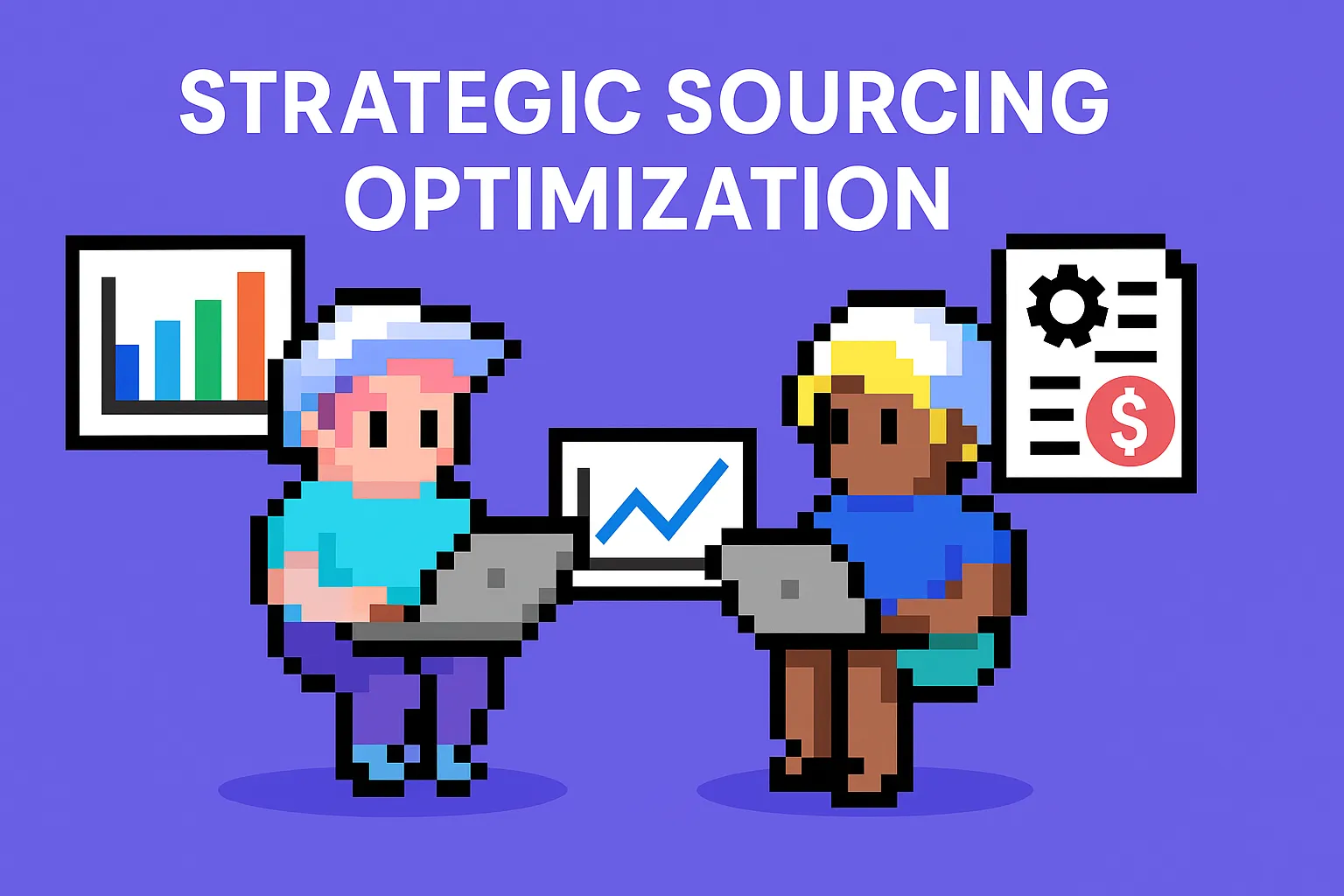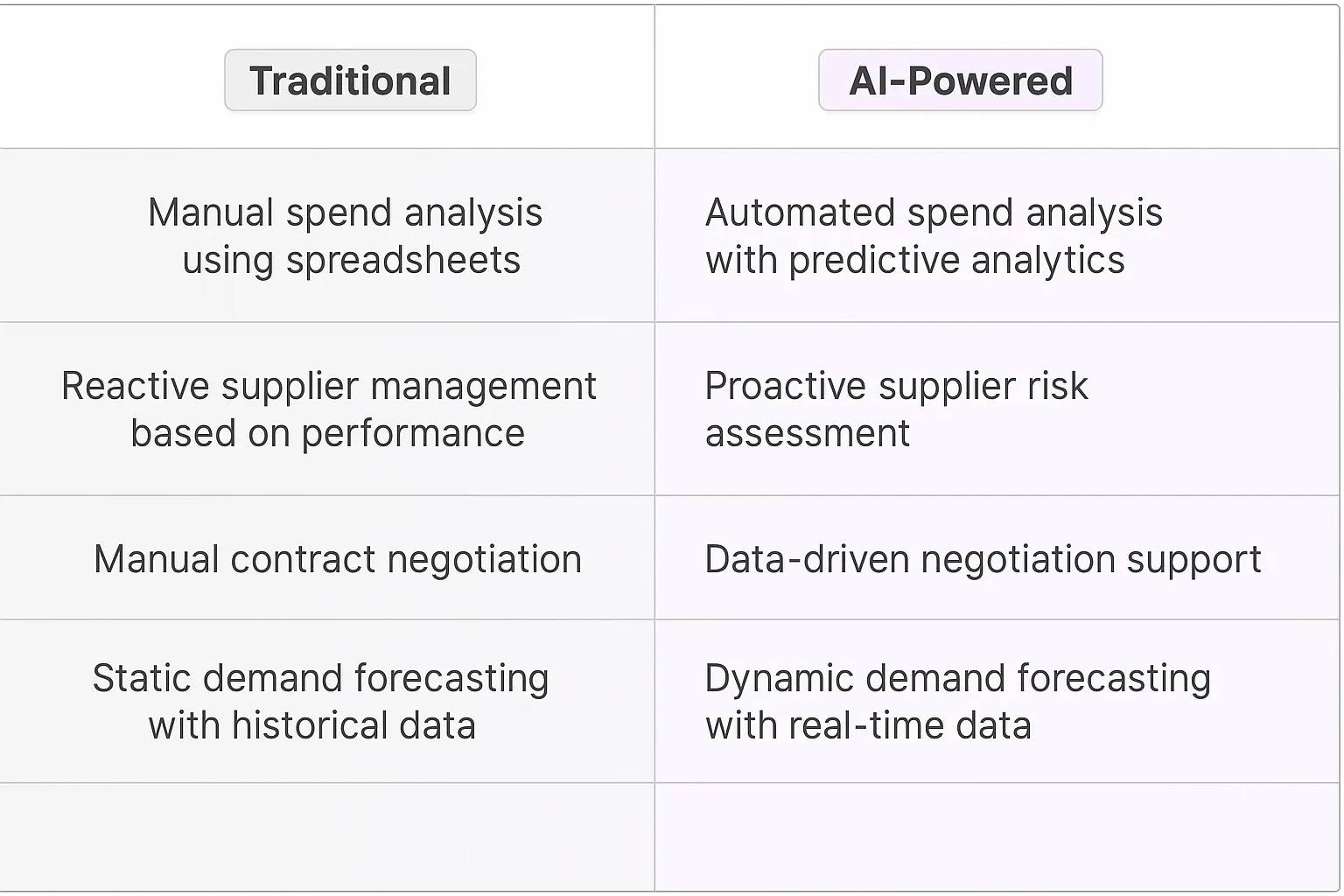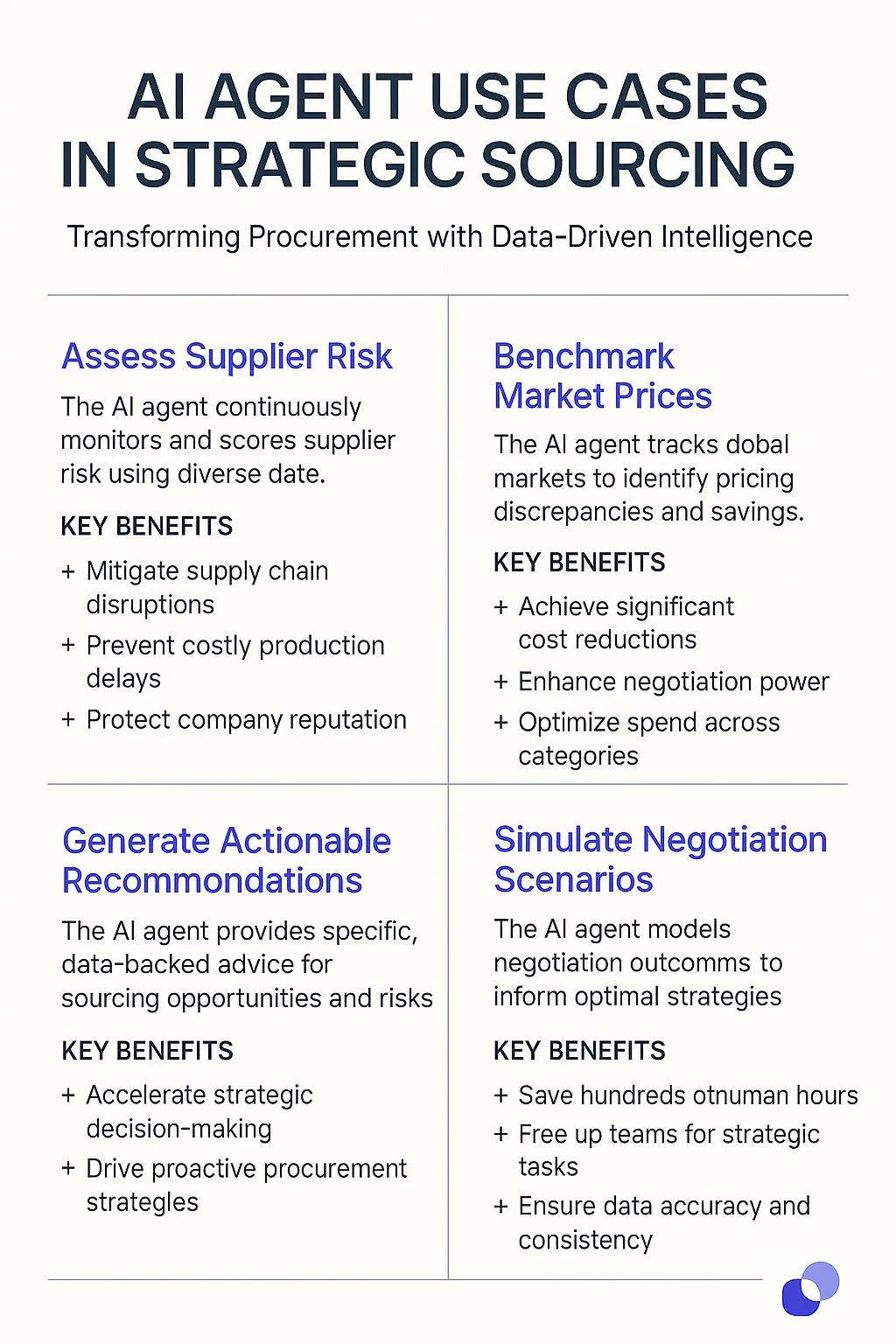Strategic Sourcing Optimization AI Agents
Revolutionizing Procurement with AI-Powered Strategic Sourcing
Strategic Sourcing Optimization is the process of continuously improving and re-evaluating a company's purchasing activities. It's not just about cutting costs; it's about creating value. Think of it as the art of getting the right stuff, from the right place, at the right time, for the right price. But here's the kicker - it's not just a one-time thing. It's an ongoing process that involves analyzing spend data, market conditions, and supplier capabilities to make informed decisions that align with the company's overall strategy.
Now, let's talk about what makes Strategic Sourcing Optimization tick. First up, we've got spend analysis. This is like putting your company's purchasing habits under a microscope. It's about understanding where every dollar goes and why. Next, there's supplier evaluation and selection. This isn't just picking the cheapest option; it's about finding partners who can grow with you. Then we've got contract negotiation and management. This is where the rubber meets the road - getting the best terms possible and making sure everyone sticks to them. Finally, there's continuous improvement. Because in today's fast-paced market, if you're not moving forward, you're falling behind.
But here's where it gets interesting. Enter AI agents. These digital teammates are taking Strategic Sourcing Optimization to a whole new level. They're crunching numbers faster than any human could, spotting patterns we might miss, and making predictions that feel like they're straight out of a sci-fi movie. They're not replacing humans; they're supercharging them. With AI agents, Strategic Sourcing Optimization isn't just a process - it's a competitive advantage that's reshaping entire industries.

Benefits of AI Agents for Strategic Sourcing Optimization
What would have been used before AI Agents?
Before AI agents entered the scene, strategic sourcing was a manual, time-consuming process. Procurement teams relied on spreadsheets, basic analytics tools, and gut instinct to make decisions. They'd spend countless hours sifting through supplier data, negotiating contracts, and trying to forecast demand. It was like trying to solve a Rubik's Cube blindfolded – possible, but incredibly inefficient.
Companies often leaned on legacy ERP systems or specialized sourcing software that offered limited insights. These tools were like using a map from the 1990s to navigate today's rapidly changing business landscape. They'd get you somewhere, but probably not where you needed to go.
What are the benefits of AI Agents?
Enter AI agents for strategic sourcing optimization. These digital teammates are game-changers, transforming procurement from a cost center to a strategic powerhouse. Here's why they're the secret weapon every CPO needs:
1. Predictive Analytics on Steroids: AI agents don't just crunch numbers; they see the future. They analyze vast amounts of data to predict supplier performance, market trends, and potential risks. It's like having a crystal ball that actually works.
2. Negotiation Ninjas: These agents learn from every interaction, becoming master negotiators. They can simulate thousands of negotiation scenarios in seconds, identifying the optimal strategy for each supplier. It's like having the world's best poker player on your team, but for procurement.
3. Demand Forecasting Wizards: AI agents tap into internal and external data sources to forecast demand with uncanny accuracy. This isn't just guesswork; it's data-driven clairvoyance that helps companies optimize inventory levels and reduce costs.
4. Supplier Discovery and Evaluation on Autopilot: AI agents scour the globe for potential suppliers, evaluating them based on countless factors. They're like talent scouts for your supply chain, always on the lookout for the next big thing.
5. Real-time Market Intelligence: These digital teammates constantly monitor market conditions, alerting you to opportunities or threats. It's like having a team of analysts working 24/7, but without the coffee breaks.
6. Compliance Guardian Angels: AI agents ensure every transaction complies with regulations and company policies. They're the ultimate backstop, catching potential issues before they become problems.
7. Continuous Learning and Improvement: Unlike traditional systems, AI agents get smarter over time. They learn from every decision, every transaction, constantly refining their algorithms. It's like having a procurement team that never sleeps and never stops improving.
The bottom line? AI agents for strategic sourcing optimization aren't just tools; they're transformative forces. They're turning procurement into a strategic advantage, giving companies the edge in a hyper-competitive global market. In the world of strategic sourcing, AI agents are the difference between playing checkers and chess. And in this game, the AI-powered players are the grandmasters.

Potential Use Cases of AI Agents with Strategic Sourcing Optimization
Processes
Strategic sourcing optimization is ripe for AI-driven transformation. These digital teammates can revolutionize how procurement teams operate, bringing a level of efficiency and insight that was previously unattainable. Let's dive into some concrete examples of how AI agents could reshape strategic sourcing processes:
- Supplier Risk Assessment: AI agents can continuously monitor and analyze vast amounts of data from various sources to provide real-time risk assessments of suppliers. They can flag potential issues before they become critical, allowing procurement teams to proactively manage supplier relationships.
- Demand Forecasting: By analyzing historical data, market trends, and even external factors like weather patterns or economic indicators, AI agents can generate highly accurate demand forecasts. This enables more precise inventory management and helps optimize order quantities.
- Contract Negotiation Support: AI agents can analyze past contracts, market rates, and supplier performance to provide negotiators with data-driven insights and recommendations during contract discussions. This can lead to more favorable terms and significant cost savings.
- Spend Analysis: AI-powered spend analysis can uncover hidden patterns and opportunities for cost reduction across the organization. These digital teammates can categorize and analyze spend data at a granular level, identifying areas for consolidation or renegotiation.
Tasks
Beyond high-level processes, AI agents can also tackle specific tasks within strategic sourcing optimization. Here are some examples of how these digital teammates can enhance day-to-day operations:
- RFP Generation: AI agents can draft Request for Proposal (RFP) documents by pulling relevant information from past successful RFPs, current market conditions, and specific project requirements. This not only saves time but ensures consistency and completeness in RFP creation.
- Supplier Performance Scoring: By analyzing various metrics such as on-time delivery, quality, responsiveness, and pricing, AI agents can generate objective supplier performance scores. This enables procurement teams to make data-driven decisions about supplier relationships.
- Price Benchmarking: AI agents can continuously scan market data, competitor pricing, and historical purchase information to provide up-to-date price benchmarks for goods and services. This ensures that procurement teams always have the latest pricing information at their fingertips.
- Compliance Monitoring: These digital teammates can automatically check supplier documentation, certifications, and regulatory compliance, flagging any issues or expirations that require attention. This helps mitigate risks and ensures ongoing compliance with regulatory requirements.
The integration of AI agents into strategic sourcing optimization isn't just about automating routine tasks. It's about augmenting human capabilities, enabling procurement professionals to focus on strategic decision-making and relationship building. As these AI capabilities continue to evolve, we'll likely see a shift in how procurement teams operate, with AI handling much of the data analysis and routine tasks while humans focus on high-level strategy and complex negotiations.
The key to success will be finding the right balance between AI capabilities and human expertise. Organizations that can effectively leverage AI agents in their strategic sourcing processes will gain a significant competitive advantage, driving cost savings, reducing risks, and improving overall supply chain performance.

Industry Use Cases
AI agents are reshaping strategic sourcing optimization across industries, and their impact is far from superficial. These digital teammates are diving deep into complex supply chains, crunching massive datasets, and delivering insights that human analysts might miss. Let's explore some industry-specific scenarios where AI is not just assisting, but fundamentally transforming sourcing processes.
From automotive giants fine-tuning their global supplier networks to fast-fashion retailers predicting material trends months in advance, AI agents are becoming indispensable partners in strategic decision-making. They're not just number crunchers; they're pattern recognizers, risk assessors, and opportunity spotters rolled into one. And the best part? They're learning and improving with every interaction, making them more valuable over time.
In the following examples, we'll see how AI agents are tackling real-world sourcing challenges, from reducing costs and mitigating risks to uncovering hidden efficiencies and driving innovation. These aren't hypothetical use cases - they're snapshots of the AI-driven sourcing revolution that's already underway.
Automotive Industry: Driving Efficiency with Strategic Sourcing AI
The automotive industry is ripe for disruption, and strategic sourcing optimization AI agents are the perfect catalysts. These digital teammates are transforming how car manufacturers approach their supply chains, turning a traditionally sluggish process into a lean, mean, efficiency machine.
Take Tesla, for instance. They're not just disrupting the industry with electric vehicles; they're also revolutionizing how cars are built. By leveraging AI for strategic sourcing, Tesla could potentially optimize its entire supply chain, from raw materials to final assembly.
Here's where it gets interesting: AI agents can analyze vast amounts of data from multiple suppliers, considering factors like cost, quality, delivery times, and even geopolitical risks. They're not just crunching numbers; they're identifying patterns and making predictions that humans might miss.
For example, an AI agent could forecast potential supply chain disruptions based on historical data and current global events. It might suggest stockpiling certain components or diversifying suppliers for critical parts. This proactive approach could save millions in potential losses from production delays.
But it doesn't stop there. These AI agents can also negotiate with suppliers in real-time, adjusting orders based on demand forecasts and production schedules. Imagine an AI that can instantly renegotiate contracts with hundreds of suppliers when a sudden spike in demand for electric vehicles occurs.
The result? A more agile, responsive, and cost-effective supply chain. For an industry where margins are tight and competition is fierce, this could be the difference between leading the pack and being left in the dust.
Strategic sourcing optimization AI isn't just a tool; it's a game-changer for the automotive industry. It's turning the traditional, reactive supply chain into a proactive, intelligent network that adapts in real-time to market demands and global conditions. This is the future of automotive manufacturing, and it's happening now.
Aerospace Industry: Soaring to New Heights with Strategic Sourcing AI
The aerospace sector is about to hit some serious turbulence - in the best way possible. Strategic sourcing optimization AI agents are set to propel this industry into a new era of efficiency and innovation. We're talking about a seismic shift that could redefine how aerospace giants like Boeing and Airbus operate.
Let's zoom in on Airbus. They're already pushing boundaries with their aircraft designs, but imagine what they could achieve by unleashing AI on their supply chain. These digital teammates could transform their sourcing strategy from a complex, manual process into a sleek, data-driven operation.
Here's where it gets really interesting: AI agents in aerospace aren't just about crunching numbers. They're about predicting the future. These algorithms can analyze terabytes of data from suppliers worldwide, factoring in everything from material costs and quality metrics to geopolitical risks and environmental regulations.
Picture an AI that can forecast titanium prices 18 months out, or predict which suppliers are likely to face disruptions due to climate change. This isn't science fiction - it's happening now. Airbus could use these insights to make strategic decisions about when to buy, how much to stock, and which suppliers to partner with for long-term stability.
But wait, there's more. These AI agents can also optimize the actual design process. By analyzing data on material performance, cost, and availability, they could suggest alternative components that offer better performance at lower costs. We're talking about AI that doesn't just source parts - it helps engineer better planes.
And let's not forget about sustainability. With increasing pressure to reduce carbon footprints, AI agents could prioritize suppliers with lower emissions, helping aerospace companies meet their green targets without sacrificing performance or profitability.
The impact? A more agile, efficient, and sustainable aerospace industry. Companies that embrace this tech will be able to respond faster to market changes, reduce costs, and push the boundaries of what's possible in aircraft design.
Strategic sourcing optimization AI isn't just a tool for the aerospace industry - it's the key to unlocking the next generation of flight. It's turning the traditionally slow-moving world of aerospace manufacturing into a dynamic, responsive ecosystem that can adapt on the fly. This is the future of aerospace, and it's taking off right now.
Considerations
Technical Challenges
Implementing a Strategic Sourcing Optimization AI Agent isn't a walk in the park. It's more like trying to teach a robot to play 4D chess while juggling flaming torches. The technical hurdles are real, and they're not for the faint of heart.
First up, data integration. Your AI agent needs to feast on a smorgasbord of data from various systems - ERP, CRM, supplier databases, market intelligence platforms. But here's the kicker: these systems often speak different languages. It's like trying to host a dinner party where each guest only speaks their native tongue. You need a universal translator, and in this case, it's robust APIs and data normalization processes.
Then there's the machine learning model itself. Training an AI to understand the nuances of strategic sourcing is like teaching a newborn to navigate the stock market. It requires vast amounts of historical data, and let's face it, many companies have been treating their sourcing data like that junk drawer in the kitchen - it's there, but it's a mess. Cleaning and structuring this data is a Herculean task that can't be overlooked.
And don't even get me started on the real-time processing requirements. Your AI agent needs to crunch numbers faster than a squirrel on espresso, analyzing market trends, supplier performance, and risk factors on the fly. This demands some serious computational firepower and optimized algorithms.
Operational Challenges
On the operational front, implementing a Strategic Sourcing Optimization AI Agent is like trying to change the tires on a moving car. It's doable, but it's going to be a bumpy ride.
First, there's the human factor. Your procurement team has been doing things their way for years. Now you're bringing in a digital teammate that's going to shake things up. It's like introducing a Roomba to a team of professional housekeepers. There's going to be resistance, skepticism, and a learning curve steeper than San Francisco's Lombard Street.
Then there's the process reengineering. Your existing sourcing processes probably have more twists and turns than a pretzel factory. Adapting these to work with an AI agent isn't just about plugging in a new system. It's about fundamentally rethinking how you approach strategic sourcing. It's like trying to retrofit a horse-drawn carriage into a Tesla - at some point, you realize you need to start from scratch.
And let's not forget about the suppliers. They're used to dealing with humans, negotiating over long lunches and rounds of golf. Now they're facing an AI that doesn't care about their jokes or their putting skills. It's all about the data. Helping suppliers adapt to this new reality is crucial, unless you want your supply chain to look like a ghost town.
Lastly, there's the ongoing maintenance and improvement of the AI agent. This isn't a set-it-and-forget-it solution. It's more like adopting a very demanding pet that needs constant attention, training, and occasional trips to the vet (or in this case, the data scientists). You need to be prepared for the long haul, continuously feeding it new data, refining its algorithms, and adapting it to changing market conditions.
Implementing a Strategic Sourcing Optimization AI Agent is a journey, not a destination. It's going to be challenging, it's going to be frustrating at times, but for those who can pull it off, it's going to be a game-changer. Just remember, in the world of AI, the early bird doesn't just get the worm - it gets the whole darn garden.
The Future of Procurement: AI Agents as Strategic Powerhouses
Strategic Sourcing Optimization AI Agents are more than just a technological advancement; they're a paradigm shift in how businesses approach procurement and supply chain management. These digital teammates are turning what was once a cost center into a strategic powerhouse, driving innovation, efficiency, and competitive advantage.
The impact of these AI agents is already being felt across industries, from automotive giants fine-tuning their global supplier networks to aerospace companies pushing the boundaries of what's possible in aircraft design. They're not just crunching numbers; they're predicting trends, mitigating risks, and uncovering opportunities that human analysts might miss.
But let's be real - implementing these AI agents isn't a walk in the park. It comes with its own set of technical and operational challenges. From data integration hurdles to the need for process reengineering, companies need to be prepared for a journey, not a quick fix.
Despite these challenges, the potential rewards are too significant to ignore. In a world where margins are tight and competition is fierce, Strategic Sourcing Optimization AI Agents could be the difference between leading the pack and being left in the dust.
As we look to the future, one thing is clear: AI-driven strategic sourcing isn't just coming; it's already here. The companies that embrace this technology, navigate the challenges, and effectively integrate these digital teammates into their operations will be the ones writing the next chapter of business success. The question isn't whether to adopt this technology, but how quickly you can get on board. Because in the race for strategic advantage, the AI-powered players are already pulling ahead.













